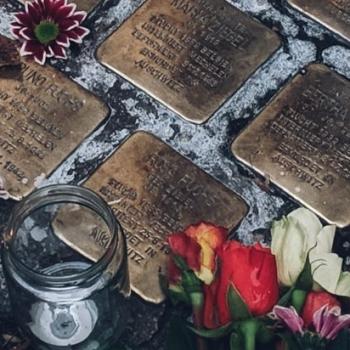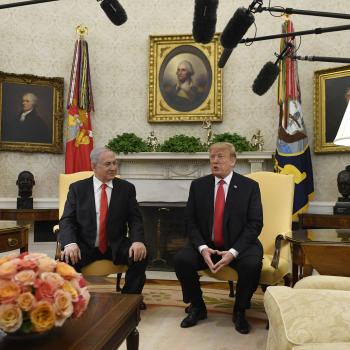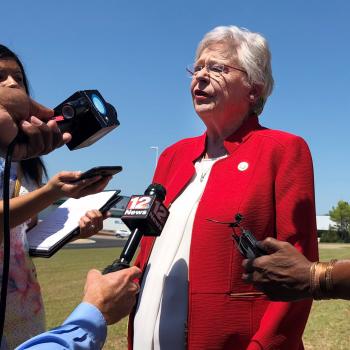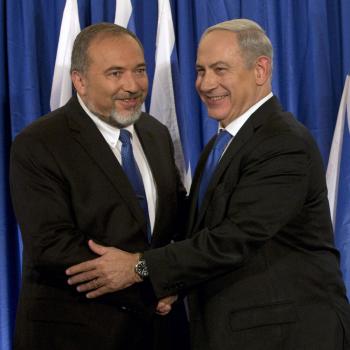by Shalom Goldman, Duke University
Throughout the world sports fans can be roused to emotional extremes of enthusiasm, euphoria, and despair that seem almost religious in nature. The only other public manifestation of emotion that comes close to sports in its intensity is at rock and roll concerts—and these concerts are increasingly held in sports stadiums. Also, more and more American sports greats are willing and eager to speak publicly about their Evangelical Christian commitments. These players on U.S. baseball, basketball, and football teams have often expressed their belief in a Higher Power, and their fans have in turn expressed their “belief” in the teams and players
In Europe, Asia, and Africa where soccer (the “real futbol”) is king—or should I say God—religion rarely intrudes into the sports domain.
But in Israel its somewhat more complicated.
Situated geographically in Asia and culturally in Europe, Israel embraced soccer with wild enthusiasm from the time of the state’s establishment in 1948. And it did so with little trace of religious ideas or practices. Actually, the Jewish embrace of soccer came decades before 1948. For the Jews living in British Mandate Palestine, team sports were organized along the political lines of the Yishuv (the loose “state in the making” amalgamation), with sports teams representing Left, Right, and center political affiliations. The assertively secular character of the Yishuv—which drew on the impulse to create a “new Jew”: muscular, athletic, and capable of self-defense—left God’s laws out of the stadium. And because orthodox Jews had little clout in pre-state Palestine, soccer matches were often scheduled on Saturday, the Jewish Sabbath. The same arrangement persisted after 1948, despite the protests of Ultra-Orthodox (Haredi) Jews, whose numbers and political strength grew from the 1970s onward.
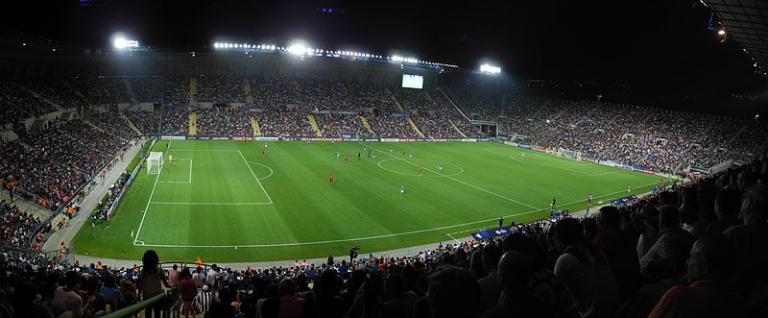
The number of Israeli soccer teams has also grown—today there are thirty teams—and their economic clout is considerable. And the players and fans are drawn from all sectors of Israel’s citizenry, not only from its Jewish population. There are Arab players on the Jewish teams, and there are Arab teams, some with Jewish team members that are giving the Jewish teams a run for their money.
As I noted in a July 1st article from Israel, “Many Israeli Arabs (who comprise 15 percent of the Israeli population) also attend professional soccer games, often rooting for Arab players. And in response to (anti-Arab) chants from Jewish fans, especially those of Beitar Jerusalem fans, they have responded with their own anti-Jewish taunts. And recently, an Arab team, Bnei Sachnin, a team with some Jewish players and many Jewish fans, has risen to prominence.”
In Israel, an exception to this secularizing tendency in sports is the observance of Yom Kippur, the Day of Atonement, when no public events are held.
For American Jews, whose “Sabbath rest” may include attendance at sports events, the ban on Yom Kippur sports is quite familiar. In fact, one could argue that a landmark day in American Jewish history is Yom Kippur of 1965 (October 6th), when Sandy Koufax, the great LA Dodgers pitcher, refused to play against the Minnesota Twins in the first game of the world series.
(In the Coen brothers’ film The Great Lebowski, The Dude—played by Jeff Bridges—tells the Walter Sobchak character, played by John Goodman, that in keeping kosher and following other Jewish laws he is “living in the f…ing past.” Sobchak’s answer: “Three thousand years of beautiful tradition from Abraham to Sandy Koufax…you’re goddamn right I’m living in the f….ing past.”
So, in Israel, no spectator sports on Yom Kippur—but the other days of the year are fair game.
It’s worth noting that the Jewish tradition isn’t the only one that has a problem with Sabbath sports. The Mormon church too is quite strict about the commandment to keep the Sabbath holy. No games are held on Sundays at the Mormon church’s Brigham Young University.
Back in Israel (where Lebowski has a considerable cult-following, and where Brigham Young University has a campus), “Shabbat Soccer” even overcame the traditional Tel Aviv–Jerusalem dichotomy: that the “first Hebrew city” Tel Aviv, was essentially secular, and that the ancient city of Jerusalem was inherently religious. Soccer trumped strict observance and in Jerusalem and throughout the country soccer was a Saturday phenomenon.
Against this background the announcement this week that one of Israel’s top teams, Beitar Jerusalem, would no longer hold home games on Shabbat came as something of a surprise. As reported in an AP story :
One of Israel’s top football teams has announced that it will not play any of its home games this season during the Jewish Sabbath, bucking the trend in the country…Beitar Jerusalem Football club said Sunday that it had come to an agreement with Israeli broadcasters to ensure that its home games will only be played on Saturday night or on weekdays…A statement on the club’s official website said that “despite the economic risk, Tabib (the team owner) preferred to accommodate the crowd and give more sectors of the community the option to come and support the team.”
In the Jewish State, the heady mix of politics, religion, and soccer is nothing new. A quarter of a century ago the New York Times noted that “In Jerusalem, soccer is also political football.”
The controversy back then, in the late 1980s, was about building a new soccer stadium in the city. The legendary long-term mayor of the city, Teddy Kollek, had promised the fans a stadium, but construction was delayed because of vigorous and at times violent protest by Ultra-Orthodox Jews. At a demonstration, the Times reporter heard a young secular Israeli counter-demonstrator yell at a Haredi man, “If you don’t give us the stadium, we’re going to burn Meah Shearim (Jerusalem’s Ultra-Orthodox stronghold).” (NY Times, “In Jerusalem, Soccer is also political football,” October 16, 1987)
In the 1990s, Teddy Stadium was finally built (and Meah Shearim was spared!)—and soccer games were held on Saturdays. But now that is going to end.
This will no doubt exacerbate tensions between secular and Orthodox Jews—tensions expressed at the ballot box, the public square, and the sports arena.
Shalom Goldman, Religion Department, Duke University



